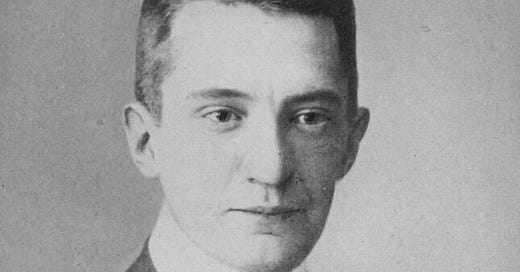Alexander Kerensky, a tragic figure with a story to tell
Sometimes, aligning with those we think are closer to our views is a fatal mistake
On this date 140 years ago, in the city of Simbirsk in the Russian Empire, Alexander Kerensky was born. He grew up in the relatively brief period of Russian history between the old system of serfdom, and the newer version of serfdom that was to come, Marxism-Leninism.
A man of humble origins as the great-grandson of a serf, he would go on to briefly lead his nation as the minister-chairman of the Russian Provisional Government in 1917. The Provisional Government isn’t talked about much, but it was the original successor to the monarchy as a result of the February Revolution. The government was a moderate one, and Kerensky himself was a moderate socialist. The party he aligned with was known as the Trudoviks. They were a social-democratic party, that was a breakaway faction of the Social Revolutionary Party, itself an agrarian social-democratic party.
After the February Revolution, which overthrew the monarchy, Kerensky along with Mikola Ckheidze and Matvey Skobelev became the Soviet chairmen under the leadership of Prince Georgy Lvov. The initial actions of the new government were to establish a liberal, capitalist bourgeois order, repealing the death penalty and guaranteeing freedom of the press.
The left were not satisfied with this. The followers of Lenin, who arrived in Russia in April, sought to replace the liberal order with communism. Initially, they did not have much support among even the Bolsheviks. But the government’s decision to carry on with the war changed this. Soldiers protested in July, causing chaos, and resulting in Lenin’s temporary re-exiling.
Within the “White movement,” which was a wide coalition of anti-communists, there were liberals, social democrats and ultra-conservative monarchists. This was naturally a difficult coalition to hold together due to the sometimes-contradictory goals of its constituent parts. Still, if there was to be any hope of maintaining a liberal government, as opposed to a communist state, it would have to hold together.
The White movement, however, had a strong military element, which sought to continue the fight in the Great War, which had become widely unpopular. Kerensky’s liberal policies were unpopular with the soldiers in the movement, creating a division which was cemented by his own philosophy of “no enemies to the left.” He incorrectly calculated that the enemies of the old order would help him to keep the monarchists at bay, and freed many political prisoners of the empire to assist his political project.
Of course, we all know how things eventually turned out. The Bolsheviks, including some of those former prisoners, embraced Lenin, resulting in the October Revolution and the establishment of state socialism.
Kerensky, who by then had become the head of the Provisional Government, had to flee his country. He lived mostly in France until the Nazis invaded, eventually settling in New York.
At the beginning of his long career, the legendary columnist William Safire interviewed Kerensky. He reminisced about it in 1993 in this piece:
GHOST AT THE SUMMIT: THE LESSONS OF ALEXANDER KERENSKY
Kerensky blamed his failure to maintain liberal democracy in Russia on…well…liberal democracy. If he had kept some of the old enemies, like Stalin, imprisoned, he reasoned, they would not have been able to rise up against his government.
There is some truth to that, of course, and liberalism must be tempered with practical concerns. It is arguable whether the Provisional Government had any hope of prevailing in a country with no history of democratic rule. One might look at Russia today as proof of the hopelessness of the February Revolution. Still, if he had been able to somehow hold that tenuous group together, perhaps by drawing down Russia’s military involvement, while throwing a few bones to the right, the world might have been spared the deadly experiment of Marxism-Leninism.
Kerensky lived out his post-WWII life as a professor of Russian history. It may be unfair to characterize him as a bitter old man, yet…there is probably something to that way of describing him. Certainly, he was dealt some very bad hands, with his second wife dying of a terminal illness. When he died in 1970, the local Orthodox Church forbad his burial in consecrated ground. Even in death, he could not escape the conflicts of the temporal world.
I see Kerensky as a tragic figure…a man who wanted to do the right thing, but could not align the necessary forces to resist tyranny. If there is a lesson to be learned from his life, it is perhaps this: choose your friends well, lest you find out that they are not actually your friends.



